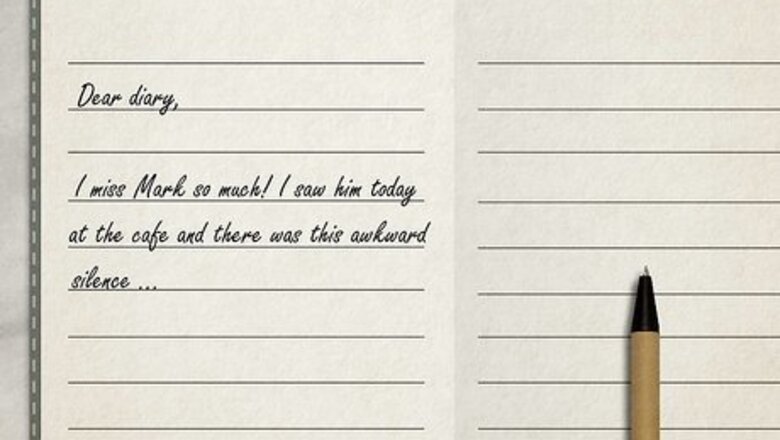
views
Write out your feelings in a journal.
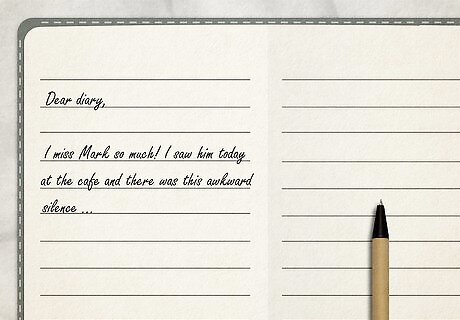
Getting it out on the page can be a great release. If you find yourself ruminating, write down what you're thinking. Note how your thoughts are making you feel as well. When you're done, reread what you wrote to gain a deeper understanding of your feelings and let them go. If you've been thinking a lot about your last conversation with this friend, note how it's making you feel. Perhaps you're angry with them for what they said, or maybe you're still hurt by their words. Process your feelings in a way that's helpful for you. If you don't like writing long-form journal entries, try sketching, writing poems, or making lists.
Compose a letter that you'll never send.
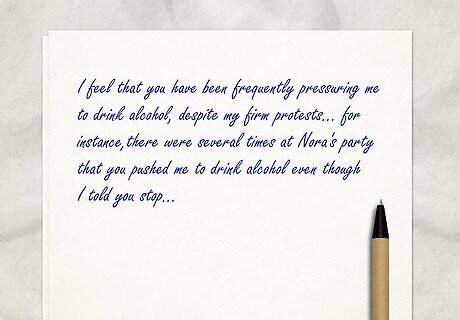
Address the friend that you lost to give yourself closure. Maybe there are some things that you wish you would have said or some questions you still have. Write it all down. When you're done, rip up the letter, throw it away, or ceremoniously burn it. Though you may never get to say these things to the friend's face, releasing your feelings in this way can help you put them to rest.
Get rid of things that remind you of them.
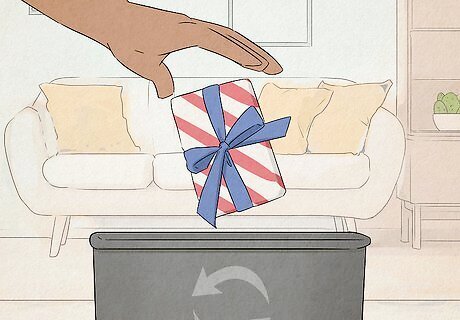
Do this at least temporarily. Box up or give away any gifts that they gave you and mementos like postcards, old letters, or notes. Delete or archive photos and videos of them on your phone. It will help you move on and stop thinking of them if you don't have things around your house reminding you of them. If throwing things out or giving them away feels too extreme, at least store them away from where you can see them for a while.
Mute, unfriend, or block them on social media.
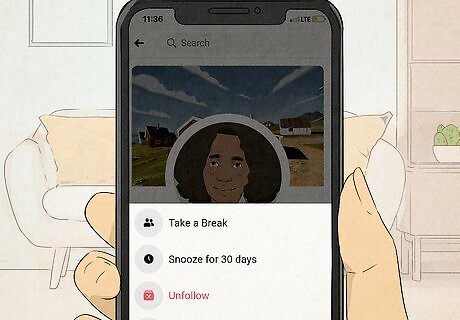
Looking at their social media will only make you think about them more. Mute their posts and stories on sites like Instagram and Twitter so that they don't turn up on your feed. If you want to make sure you can't see or contact each other, blocking them may be the best option. Though it can be hard to remember sometimes, know that unfriending or blocking someone isn't mean. Sometimes it's what you have to do to heal and move on.
Talk it out with a trusted family member or friend.
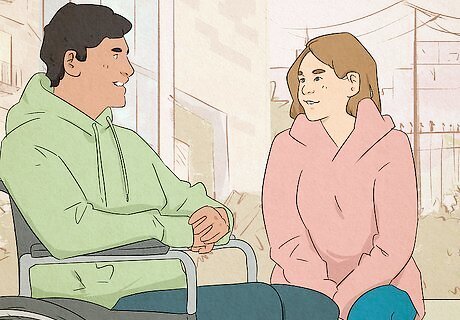
Take some time to vent if you can. A family member or friend that knows you well can help you process what happened. Talk about the experience and how you're feeling. Listen to any advice or feedback your friends and family give you. After, ask them how they're doing and talk about something else for a while to give yourself a break from the subject. Avoid talking out your feelings with someone who is also friends with your lost friend. This could create unwanted drama or put them in an uncomfortable position.
Take care of yourself.
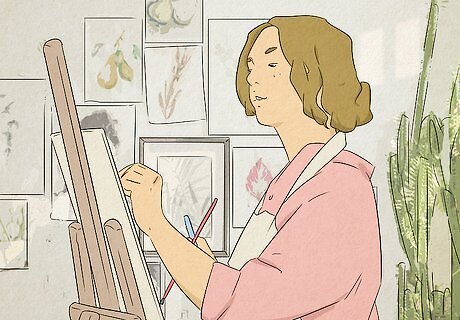
Focus on meeting your physical and emotional needs. It's hard, but you can thrive in life, even without this friendship. Eat healthy foods, get plenty of sleep, and exercise regularly so that you can invest your energy in your work, interests, and hobbies. Focusing on yourself, rather than your lost friend, can help you rebuild your self-esteem and figure out what you want out of future friendships. Get back into what you love. Take a painting class if you enjoy making art. Go on a challenging hike if you like being in the outdoors. Throw yourself into the things that make you happy. Try new things to discover your full potential. If you've always wanted to play the piano, now's the time to sign up for lessons. Being open to new experiences can help you meet new people and remember that there is still a lot in store for your life.
Reframe how you view any mistakes that you made.
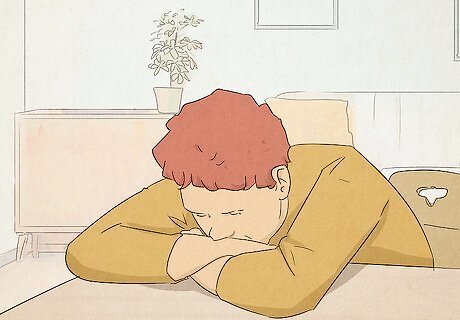
Look at them as lessons for how you want to act in future friendships. It's possible you simply drifted apart, or perhaps your friend was the one who made mistakes. If your actions did contribute to the end of your friendship, though, be compassionate with yourself. Reflect on your past mistakes, but forgive yourself so that you can move on and change your behavior. For example, If you struggled with being dependable in your past friendship, make a point to always follow through with plans going forward.
Practice mindfulness.

This helps you break the cycle of rumination. If you're stuck on thoughts of your lost friendship, redirect your thoughts to your senses. If you're outside, focus on the weather and how it feels. Notice if you hear any sounds, like birds chirping or a truck driving by. By redirecting like this, you can interrupt obsessive thoughts before they get out of hand. You don't have to dedicate specific times to practice mindfulness. Use it as a quick tool to get back on track anytime your thoughts are running away from you.
Meditate to quiet your mind.
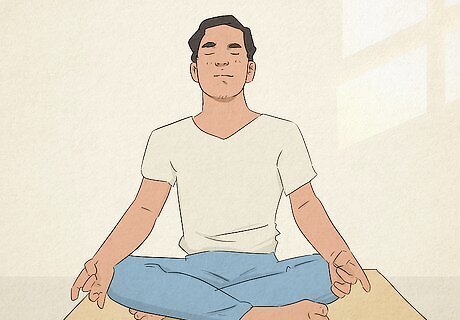
Even 5 minutes of meditation a day can do wonders. First, choose a comfortable place to sit. Then, focus on only your breaths. Breathe in and out slowly, noticing the gentle rise and fall of your abdomen. If any thoughts come your way, let them pass without attachment. This practice can really help you regain control if you find yourself ruminating endlessly. If you struggle to quiet your mind, try repeating a mantra in your head. Choose calming words like "quiet," "stillness," and "peace." You can also imagine a calming image to quiet your mind. Picture a scenic beach, a beautiful forest, or any scene that helps you relax. As you get more comfortable with the practice, up the amount of time you spend meditating from 5 to 15 minutes.
Seek help from a therapist or counselor.
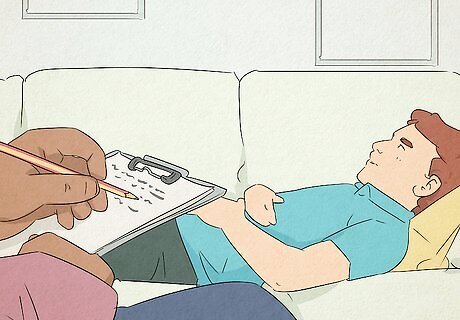
They can help give you the tools to move on if you're really struggling. If your obsessive thoughts about your lost friend are distracting you at work or school and getting in the way of your ability to be happy, seek guidance from a mental health professional. They can help you process your feelings and give you advice on how to control your thoughts. To start seeing a therapist or counselor, get a referral from your doctor or search online for one in your area. The end of a friendship can be heartbreaking, sometimes even more so than losing a romantic partner. Don't be hard on yourself if you need some extra support. It's completely normal and understandable.
















Comments
0 comment